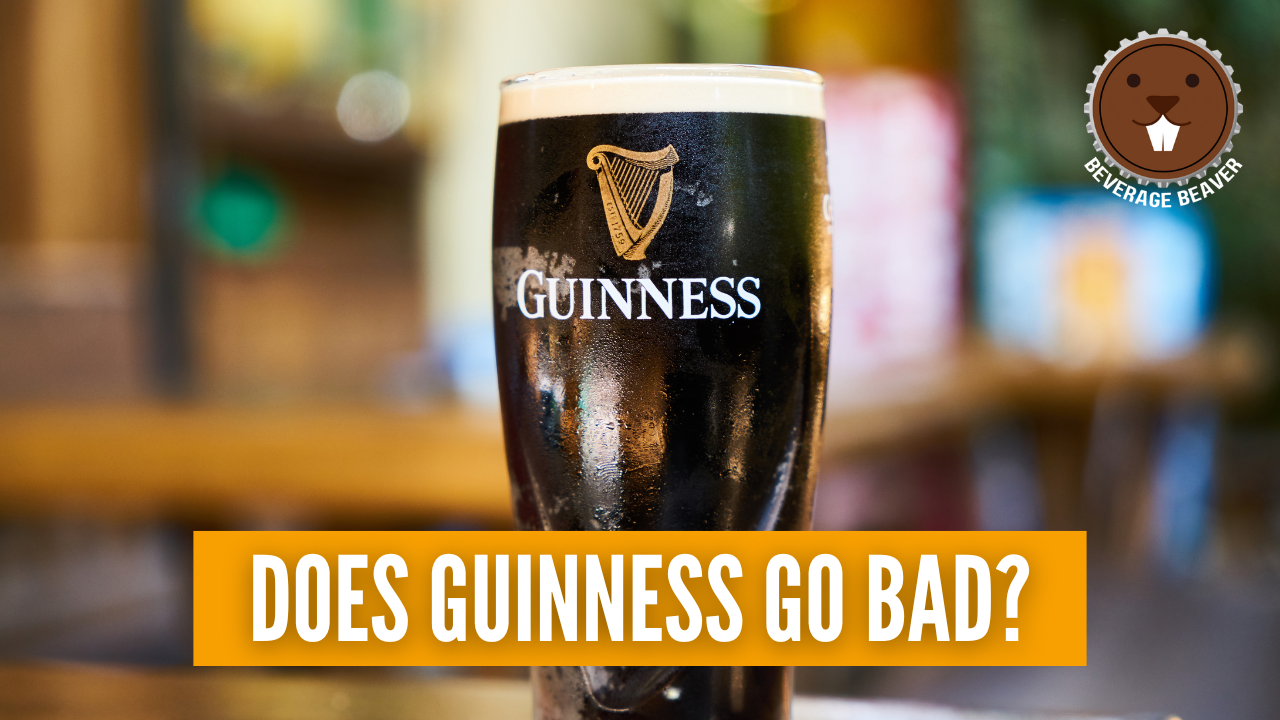Does Guinness Go Bad And Does It Become Dangerous?
Just like many other products, beer is always best the fresher you can get it. But if you’re unable to take a quick trip to Dublin and instead have to settle for a can that’s been shipped across the ocean, it’s good to know of Guinness ever goes bad. In a nutshell, here’s what you need to know;
The hops and alcohol in beer act as natural preservatives, meaning it’s unlikely drinking out-of-date beer is dangerous. The flavor does become worse over time. Guinness recommends not drinking their beer past the expiration date.
Continue reading to find out more about the best way to store Guinness to keep it’s flavor best, as well as how long you can store Guinness for, and how you can tell that it’s gone bad.
Does Guinness Go Bad? (Explained)
Beer is made of organic materials, which will eventually start decaying. However, unlike most other foods, beer has some natural advantages, such as it’s low PH which means bacteria don’t favor it, the hops, and alcohol.
The most important factor is the hops. While the plant is mostly added to add bitterness to beer, which is the result of alpha acids, the beta acids help counteract the growth of bacteria. This means beer generally does not spoil.
The alcohol also helps to avoid spoilage, although not as much as hops. After all, in order to work perfectly on its own, a liquid needs to have an ABV of 60%, which beer absolutely does not. However, the little alcohol in beer does help.
But unfortunately, along with the ingredients, there is also a small amount of air that is trapped inside after the bottling process. This is what causes the beer to oxidize and degrade its flavor. It also adds other flavor notes – ones that you’d probably prefer to avoid – like cardboard and mold.
There are some beers that are aged intentionally, such as very malty beers, as this can add a sweet, caramelly taste. However, this is only the case for a select few beers, and Guinness isn’t one of them.
So, it is unlikely that your Guinness becomes poisonous, but that doesn’t mean that it’ll taste as good. As a result, Guinness recommends not drinking their beer after the expiry date. In reality, you’re probably good if you’ll drink it after that too. The best way to figure out if the batch is still good is by having a taste. At the bottom of this article, we’ll tell you what to look out for. This way, you’ll know that the Guinness that you’re drinking tastes as intended.
Does Guinness Go Bad In The Fridge?
As a general rule, a beer that is kept cold will oxidize slower, meaning the taste will be preserved for longer. However, it isn’t necessary to keep it in the fridge. Any cold, dark place, like a basement, would work. Ultraviolet light affects the chemicals in hops, which ends up creating a skunky flavor. This is why most beer is sold in brown bottles that block the light. Still, it is best to protect beer from any sort of light as much as possible.
Keep in mind that a lower temperature slows down the speed at which the beer deteriorates, but it cannot stop it completely. As a result, the flavor of Guinness will change after a while. The brand does not recommend drinking it after the expiry date, as it is unlikely that it’ll taste exactly like the Guinness you’d expect. It’s best to drink it within a few months of the package date, but probably never more than a year.
Apart from staling, the hop’s flavor will also become less distinct over time. The floral or citrussy notes will disappear, and you’ll be left only with bitterness.
How Long Can You Store Guinness For?
The best is always to stick to what the brand says. In this case, Guinness recommends not drinking any of their stout past the expiry date, which you can find at the bottom of the can. This is not because drinking it after this date is dangerous; expired beer hardly ever is. It’s because the flavor degenerates after a while, and Guinness wants you to have the best possible experience.
So, the general rule is the fresher, the better. This is why many say the Guinness in Ireland tastes different than the Guinness in the US. They feel the beer tastes more bitter after having been shipped overseas. If you agree, is up to you.
As said, aging beer is a whole different ballpark. Yes, it is possible, and can add some interesting flavor notes to a beer. Unfortunately, aging Guinness would just mean creating a moldy, skunky beer.
Beers that are aged often have a high ABV that aren’t hops-forward, such as Imperial Stouts, Belgian-style Quads and Imperial Stouts. Guinness, with an ABV of 4.2% just does not fall into that category.
How Do I Know Guinness Has Gone Bad?
The easiest is to look at the expiration date and follow it; there’s a reason it’s there, after all. However, plenty have drunk Guinness past its expiry date and enjoyed it. So, as drinking Guinness past that date is (probably) not dangerous, the best way to know if it has gone bad is by tasting it.
Look out for any skunky, moldy, or cardboard-y flavor notes; that’s not how the brewers intended their stout to taste. Instead, Guinness is supposed to have roasted notes of chocolate and caramel.
Additionally, have a look at the carbonation. Guinness is supposed to have little carbonation with a thick creamy head. So, any Guinness stout with very high carbonation or without a creamy head might be an indication that it’s not good anymore.
The consistency could indicate issues too. Guinness stout is supposed to be creamy, rich, and smooth.
Keep in mind that the head, consistency, and carbonation are also a result of how the beer has been poured. Do it incorrectly, and you’re missing out on the Guinness experience.
The classic pour is probably the easiest to follow; grab a clean pint glass and hold it at a 45-degree angle. Slowly pour it off the side of the glass and gradually tilt it back upwards until it is entirely vertical. Make sure to let it settle for about 2 minutes before drinking!
Lastly, note that Guinness stout from a can vs. bottle is entirely different. The bottles are carbonated using CO2, which results in a fizzier experience rather than creamy, and a slightly more bitter taste.
However, if you’re drinking a Guinness with all of these ‘wrong’ characteristics and you enjoy it, don’t let us stop you. As said, there are plenty of people who swear Guinness doesn’t have an expiry date and can be drunk years later.
If you want to be safe, and make sure you have the best possible experience, either follow the expiry date, or look at the date it was bottled. The general consensus is that beer should be drunk within 6 months to a year of the bottling date.
For Guinness, you can find the bottling date on the lot number. You’ll find a number beginning with ‘L’, probably left of the harp icon. On this number, the first is the last number of the year (so 2 would be 2022). The next 3 digits represent the day of the year, counting from 0 (February 2nd, for example, would be 033)

